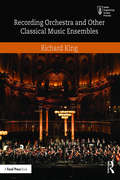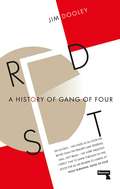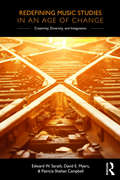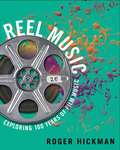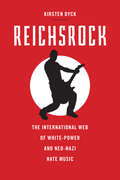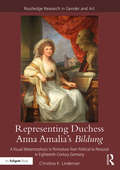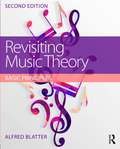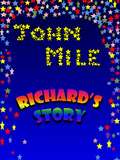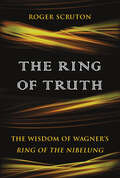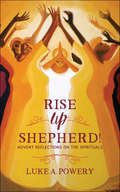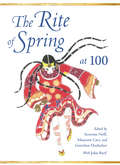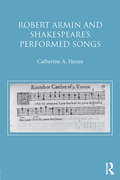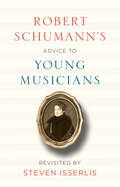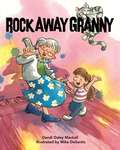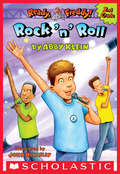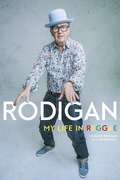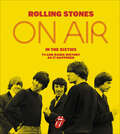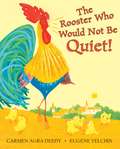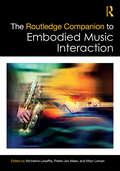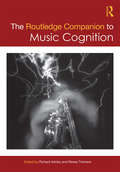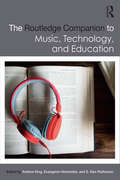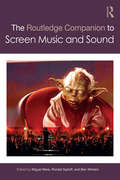- Table View
- List View
Recording Orchestra and Other Classical Music Ensembles (Audio Engineering Society Presents)
by Richard KingRecording Orchestra and Other Classical Music Ensembles explores techniques and methodologies specific to recording classical music. Whether a newcomer or a seasoned engineer looking to refine their skills, this book speaks to all levels of expertise and covers every aspect of recording symphonic and concerto repertoire, opera, chamber music, and solo piano. With a focus on the orchestra as an instrument and sound source, this book features sections on how to listen, understanding microphones, concert halls, orchestra seating arrangements, how to set up the monitoring environment, and how to approach recording each section of the orchestra. Recording Orchestra provides concise information on preparing for a recording session, the role of the producer, mixing techniques, and includes a "quick-start" reference guide with suggested setups aimed at helping introduce the reader to the recording process. A companion website, featuring audio examples of various techniques, reinforces concepts discussed throughout the book. The content of the book includes: Clear, practical advice in plain language from an expert in classical music recording, multiple Grammy award winning recording engineer, and university professor The "secret of recording": a collection of practical recording techniques that have been proven to be highly successful in the field, on many occasions Never before published information written by an industry veteran with over twenty five-years of experience in classical music recording Specific techniques and strategies for recording orchestra, opera, wind symphony, chorus, string quartet, and other common classical music ensembles.
Red Set: A History Gang of Four
by James DooleyBased on detailed interviews with band members, Red Set considers the music, art and politics that shaped Gang of Four and how the band, in turn, left an indelible mark on popular music.In the autumn of 1976, two young British Fine Arts students travelled to New York on a university grant, but instead of merely studying ended up staying with one of the city’s pioneering punk journalists, visiting the Museum of Modern Art by day and hanging out in punk epicentre CBGBs by night. It is from this trip that Gang of Four emerged. Blending revelations from interviews with the band conducted by the author with snippets from newspaper articles and record reviews, Jim Dooley tells the history of Gang of Four as they remember it. From their days at art school through countless tours, records and reunions, Red Set is the definitive history of one of Britain’s greatest and most influential bands.
Redefining Music Studies in an Age of Change: Creativity, Diversity, and Integration
by Patricia Shehan Campbell Edward W. Sarath David E. MyersRedefining Music Studies in an Age of Change: Creativity, Diversity, Integration takes prevailing discourse about change in music studies to new vistas, as higher education institutions are at a critical moment of determining just what professional musicians and teachers need to survive and thrive in public life. The authors examine how music studies might be redefined through the lenses of creativity, diversity, and integration. which are the three pillars of the recent report of The College Music Society taskforce calling for reform. Focus is on new conceptions for existent areas—such as studio lessons and ensembles, academic history and theory, theory and culture courses, and music education coursework—but also on an exploration of music and human learning, and an understanding of how organizational change happens. Examination of progressive programs will celebrate strides in the direction of the task force vision, as well as extend a critical eye distinguishing between premature proclamations of “mission accomplished” and genuine transformation. The overarching theme is that a foundational, systemic overhaul has the capacity to entirely revitalize the European classical tradition. Practical steps applicable to wide-ranging institutions are considered—from small liberal arts colleges, to conservatory programs, large research universities, and regional state universities.
Reel Music: Exploring 100 Years of Film Music
by Roger HickmanReel Music, revised for a new generation of movie lovers, tells the story of film music through iconic scenes. The Second Edition features more in-depth exploration of international films--from classics like Seven Samurai to more recent works like Run Lola Run--as well as new suggestions for activities and classroom discussion, and even more Viewer Guides, which show how film music functions moment-by-moment.
Reichsrock: The International Web of White-Power and Neo-Nazi Hate Music
by Kirsten DyckFrom rap to folk to punk, music has often sought to shape its listeners' political views, uniting them as a global community and inspiring them to take action. Yet the rallying potential of music can also be harnessed for sinister ends. As this groundbreaking new book reveals, white-power music has served as a key recruiting tool for neo-Nazi and racist hate groups worldwide. Reichsrock shines a light on the international white-power music industry, the fandoms it has spawned, and the virulently racist beliefs it perpetuates. Kirsten Dyck not only investigates how white-power bands and their fans have used the internet to spread their message globally, but also considers how distinctly local white-power scenes have emerged in Western Europe, Eastern Europe, Latin America, the United States, and many other sites. While exploring how white-power bands draw from a common well of nationalist, racist, and neo-Nazi ideologies, the book thus also illuminates how white-power musicians adapt their music to different locations, many of which have their own terms for defining whiteness and racial otherness. Closely tracking the online presence of white-power musicians and their fans, Dyck analyzes the virtual forums and media they use to articulate their hateful rhetoric. This book also demonstrates how this fandom has sparked spectacular violence in the real world, from bombings to mass shootings. Reichsrock thus sounds an urgent message about a global menace.
Representing Duchess Anna Amalia's Bildung: A Visual Metamorphosis in Portraiture from Political to Personal in Eighteenth-Century Germany (Routledge Research in Gender and Art)
by Christina K. LindemanThe cultural milieu in the “Age of Goethe” of eighteenth-century Germany is given fresh context in this art historical study of the noted writers’ patroness: Anna Amalia, Duchess of Weimar-Sachsen-Eisenach. An important noblewoman and patron of the arts, Anna Amalia transformed her court into one of the most intellectually and culturally brilliant in Europe; this book reveals the full scope of her impact on the history of art of this time and place. More than just biography or a patronage study, this book closely examines the art produced by German-speaking artists and the figure of Anna Amalia herself. Her portraits demonstrate the importance of social networks that enabled her to construct scholarly, intellectual identities not only for herself, but for the region she represented. By investigating ways in which the duchess navigated within male-dominated institutions as a means of advancing her own self-cultivation – or Bildung – this book demonstrates the role accorded to women in the public sphere, cultural politics, and historical memory. Cumulatively, Christina K. Lindeman traces how Anna Amalia, a woman from a small German principality, was represented as an active participant in enlightened discourses. The author presents a novel and original argument concerned with how a powerful woman used art to shape her identity, how that identity changed over time, and how people around her shaped it – an approach that elucidates the power of portraiture in eighteenth- and early nineteenth-century Europe.
Revisiting Music Theory: Basic Principles
by Alfred BlatterRevisiting Music Theory: Basic Principles, Second Edition, surveys the basics of music theory and explains the terms used in harmonic and formal analysis in a clear and concise manner. Students will find Revisiting Music Theory to be an essential resource for review or reference, while instructors of introductory theory courses will find in these pages a solid foundation for cultivating musical thinking. Musicians of all kinds—amateur and professional alike—will find great value in augmenting and informing their knowledge of the art of music theory. The text covers the basic principles of music theory, including:• Musical notation• Key signatures and scales• Intervals, chords, and progressions• Melodic and harmonic analysis• Counterpoint and voice leading techniques• Musical forms and structures This second edition has been revised and reorganized to promote learning. Each section now includes an all-new selection of exercises, allowing readers to practice key skills and improve understanding. For students, instructors, and practicing musicians, Revisiting Music Theory offers an indispensable guide to the foundations of musical analysis.
Richard's story
by Fernanda Silva Rando John MileRichard's story é um musical para ler inspirado nas canções dos Beatles e conta, numa sucessão de experiências e emoções, a vida do jovem Richard. De “Twist and shout” e ”Please, please me”, passando por “All my loving”, “A hard day’s night”, “I want hold your hand”, chegando a “Help!”, “Yesterday”, “Drive my car”, a história de Richard se desenvolve com “Day tripper”, “Love you to”, “A day in the life”. A viagem continua com “Magical Mistery tour”, “Hello, goodbye” e “Lucy in the sky with diamond”. Momentos felizes descritos por “Obladì, obladà” se alternam com momentos tristes, “Happiness is a warm gun”; o amor fascinante com “Julia” e perturbador com “Oh! Darling” se contrapõe ao desespero em “I’m so tired”; o desejo juvenil de revolta em “Revolution”, contrapõe-se à consciência do amadurecimento e à nostalgia dos tempos passados com “Penny Lane”. Todas as canções dos Beatles são fontes de inspiração para contar, por meio de Richard, as primeiras experiências com as garotas, as primeiras desilusões, a amizade, os primeiros problemas com os pais, a descoberta da alegria, a experiência com a droga, o medo de ficar sozinho, a busca por ajuda e, naturalmente, a descoberta do amor, em todas as suas formas e nuances. Imaginem ser levados em um vórtice de felicidade, dançando o twist. Imaginem ser arrebatados pela paixão do primeiro amor. Imaginem fugir de casa e descobrir lugares novos e conhecer amigos novos. Imaginem fazer uma fantástica viagem com o Magical Mistery Tour em pleno anos 60.
The Ring of Truth: The Wisdom of Wagner's Ring of the Nibelung
by Roger ScrutonThe vital, carefully crafted discussion on Wagner’s masterpiece, offering deep insight into both the work itself and profound perspective on certain key philosophical questions Richard Wagner’s Ring of the Nibelung is one of the greatest works of art created in modern times, and has fascinated both critics and devotees for over a century and a half. No recent study has examined the meaning of Wagner's masterpiece with the attention to detail and intellectual power that Roger Scruton brings to it in this inspiring account. The Ring of Truth is an exploration of the drama, music, symbolism and philosophy of the Ring from a writer whose knowledge and understanding of the Western musical tradition are the equal of his capacities as a philosopher. Scruton shows how, through musical connections and brilliant dramatic strokes, Wagner is able to express truths about the human condition which few other creative artists have been able to convey so convincingly. For Wagner, writes Scruton, the task of art is to “show us freedom in its immediate, contingent, human form, reminding us of what it means to us. Even if we live in a world from which gods and heroes have disappeared we can, by imagining them, dramatize the deep truths of our condition and renew our faith in what we are.” Love, death, sacrifice and the liberation that we win through sacrifice—these are the great themes of the Ring, as they are of this book. Scruton's passionate and moving interpretation allows us to understand more fully than ever how Wagner conveys his ideas about who we are, and why the Ring continues to be such a hypnotically absorbing work.
Rise Up, Shepherd!: Advent Reflections On The Spirituals
by Luke A. PoweryValuable not only for their sublime musical expression, the African American spirituals give us profound insights into the human condition and the Christian life. Many focus on an essential scene of the Christian drama: the coming of God as the child in Bethlehem and as the hope of the world and the liberator of God's oppressed people. <P><P>In these devotions for the season of Advent, Luke Powery leads the reader through the spirituals as they confront the mystery of incarnation and redemption. In Rise Up, Shepherd! each devotion features the lyrics of the spiritual, a reflection on the spiritual's meaning, a Scripture verse, and a brief prayer.
The Rite of Spring at 100
by Stephen Walsh Severine Neff Maureen Carr John Reef Gretchen HorlacherWhen Igor Stravinsky's ballet Le Sacre du printemps (The Rite of Spring) premiered during the 1913 Paris season of Sergei Diaghilev's Ballets Russes, its avant-garde music and jarring choreography scandalized audiences. Today it is considered one of the most influential musical works of the twentieth century. In this volume, the ballet finally receives the full critical attention it deserves, as distinguished music and dance scholars discuss the meaning of the work and its far-reaching influence on world music, performance, and culture. Essays explore four key facets of the ballet: its choreography and movement; the cultural and historical contexts of its performance and reception in France; its structure and use of innovative rhythmic and tonal features; and the reception of the work in Russian music history and theory. This version also includes audio and visual supplements designed to enhance understanding of this classic piece.
The Rite of Spring at 100
by Gretchen Horlacher John Reef Maureen Carr Severine Neff Stephen WalshWhen Igor Stravinsky's ballet Le Sacre du printemps (The Rite of Spring) premiered during the 1913 Paris season of Sergei Diaghilev's Ballets Russes, its avant-garde music and jarring choreography scandalized audiences. Today it is considered one of the most influential musical works of the twentieth century. In this volume, the ballet finally receives the full critical attention it deserves, as distinguished music and dance scholars discuss the meaning of the work and its far-reaching influence on world music, performance, and culture. Essays explore four key facets of the ballet: its choreography and movement; the cultural and historical contexts of its performance and reception in France; its structure and use of innovative rhythmic and tonal features; and the reception of the work in Russian music history and theory.
Robert Armin and Shakespeare's Performed Songs
by Catherine A. HenzeAfter Robert Armin joined the Chamberlain's Men, singing in Shakespeare's dramas catapulted from 1.25 songs and 9.95 lines of singing per play to 3.44 songs and 29.75 lines of singing, a virtually unnoticed phenomenon. In addition, many of the songs became seemingly improvisatory—similar to Armin's personal style as an author and solo comedian. In order to study Armin's collaborative impact, this interdisciplinary book investigates the songs that have Renaissance music that could have been heard on Shakespeare's stage. They occur in some of Shakespeare's most famous plays, including Much Ado About Nothing, Twelfth Night, Hamlet, and The Tempest. In fact, Shakespeare's plays, as we have them, are not complete. They are missing the music that could have accompanied the plays’ songs. Significantly, Renaissance vocal music, far beyond just providing entertainment, was believed to alter the bodies and souls of both performers and auditors to agree with its characteristics, directly inciting passions from love to melancholy. By collaborating with early modern music editor and performing artist Lawrence Lipnik, Catherine Henze is able to provide new performance editions of seventeen songs, including spoken interruptions and cuts and rearrangement of the music to accommodate the dramatist's words. Next, Henze analyzes the complete songs, words and music, according to Renaissance literary and music primary sources, and applies the new information to interpretations of characters and scenes, frequently challenging commonly held literary assessments. The book is organized according to Armin's involvement with the plays, before, during, and after the comic actor joined Shakespeare's company. It offers readers the tools to interpret not only these songs, but also vocal music in dramas by other Renaissance playwrights. Moreover, Robert Armin and Shakespeare's Performed Songs, written with non-specialized terminology, provides a gateway to new areas of research and interpretation in an increasingly significant interdisciplinary field for all interested in Shakespeare and early modern drama.
Robert Schumann's Advice to Young Musicians: Revisited by Steven Isserlis
by Robert Schumann Steven IsserlisIf everybody were to play first violin, we could not have an orchestra. Therefore respect each musician in his own place. There is no end to learning. Originally published in1850, Advice to Young Musicians: Musical Rules for Home and in Life offered composer Robert Schumann’s (1810–56) combination of practical advice and poetic words of wisdom for young people beginning their musical education. Presented in aphorisms and short paragraphs, the book’s insights remain as valuable today as when it was written. Recognizing the continued resonance of Schumann’s words, world-renowned cellist Steven Isserlis, himself a writer of children’s books and many articles for young musicians, set out to rescue the work from history. Here, in this beautiful gift edition, he revisits Schumann’s work and contributes his own contemporary counsel for musicians and music lovers. For this edition, Isserlis retranslated Schumann’s text and arranged it into four thematic sections: “On being a musician,” “Playing,” “Practicing,” and “Composing.” Each page is decoratively designed, and accompanying Schumann’s original quotation are Isserlis’s thoughtful and often humorous glosses. The book concludes with Isserlis’s own reflections on his life as a musician and performer: “My Own Bits of Advice (For What They’re Worth).” The result is a unique and thought-provoking book that will be treasured by aspiring musicians of any age.
Rock Away Granny
by Dandi Daley Mackall Mike DeSantisGetting dropped off at Grandma’s house could be a total snooze. Hours of sitting in the rocking chairs. But not this Grandma. Up she hops to wheel out the record player. And then, with kitty as the DJ—a dance party! The twist, the swing, the Monster Mash—they rock, rock, rock, at Granny’s house tonight. Then right as Mom returns, everyone crashes out in the rocking chairs. Just another boring night at Grandma’s (Mom thinks). Wink!Includes pictures of easy to follow dance steps like the side pass, cuddle, and underarm turn.
Rock'n'Roll (Ready, Freddy! 2nd Grade #8)
by Abby Klein John MckinleyFreddy's favorite band is having a contest -- make a video of their new song and win tickets and backstage passes to the concert! There's going to be so much competition, though. Freddy definitely needs help from his friends, and maybe even ... his sister?
Rodigan: My Life in Reggae
by David Rodigan'THE BOOK THAT EVERY REGGAE FAN SHOULD READ' John Masouri, Echoes'Rodigan can still claim a currency few presenters of his vintage can match. Perhaps it's because while his wider musical and professional milieu has been in constant change, his boundless enthusiasm has been constant. Reggae's been lucky to have him' Ian Harrison, MOJO'Rodigan was a major part of my childhood, he played the hottest tunes and in a style that just resonated with me and millions like me. Being able to contribute anything to a man that filled my life with such joy is an honour, respect, David Rodigan' Ian Wright'David is a pioneer in Reggae music. As a selector and radio personality, his vast knowledge of Jamaican music and its culture has helped to educate and fascinate music lovers around the world; he's an amazing son of the music, and an icon. We couldn't have made it this far without him' ShaggyThis is the unlikely story of David Rodigan: an Army sergeant's son from the English countryside who has become the man who has taught the world about Reggae. As the sound of Jamaica has morphed over five decades through a succession of different genres - from Ska and Rock Steady, to Dub, Roots and Dancehall - Rodigan has remained its constant champion, winning the respect of generation after generation of Reggae followers across the globe.Today, at the age of 63, he is a headline performer at almost all the UK's big music festivals, as well as events across the world. Young people revere him and he is a leading presenter on the BBC's youth network 1Xtra as well as a regular fixture at leading nightclubs such as London's Fabric and at student unions throughout the land. And he continues to go into the heartlands of Reggae, to the downtown dancehalls of Kingston and Montego Bay in Jamaica to compete in tournaments against the greatest sound systems. And yet, for all of this, David Rodigan is the antithesis of the stereotype of an international dance music DJ. 'I look like an accountant or a dentist,' he admitted to The Independent a decade ago. A man of impeccable manners, Rodigan prepares for a big sound clash by retiring to his hotel bed with a Thomas Hardy novel before taking a nap and then a cup of espresso before heading to the club. Rodigan is the inside story of this apparent paradox. It tells how a boy from Kidlington has become an admired international ambassador for a music form that remains as proud as ever of its African roots, a sound that emanates from and fiercely represents the ghetto poor. He now reaches across the age groups, from teens through to those of his own vintage. At the pinnacle of his career, Rodigan has become the DJ for all generations.'David Rodigan is a force of nature. His spirit and passion are a rare and wonderful thing. He has dedicated his life to carrying the torch for Reggae music and is hugely respected all over the world for his knowledge and talent as a broadcaster and a DJ. Long may he reign on our stages and on our airwaves' Annie Mac
Rodigan: My Life in Reggae
by David Rodigan'THE BOOK THAT EVERY REGGAE FAN SHOULD READ' John Masouri, Echoes'Rodigan can still claim a currency few presenters of his vintage can match. Perhaps it's because while his wider musical and professional milieu has been in constant change, his boundless enthusiasm has been constant. Reggae's been lucky to have him' Ian Harrison, MOJO'Rodigan was a major part of my childhood, he played the hottest tunes and in a style that just resonated with me and millions like me. Being able to contribute anything to a man that filled my life with such joy is an honour, respect, David Rodigan' Ian Wright'David is a pioneer in Reggae music. As a selector and radio personality, his vast knowledge of Jamaican music and its culture has helped to educate and fascinate music lovers around the world; he's an amazing son of the music, and an icon. We couldn't have made it this far without him' ShaggyThis is the unlikely story of David Rodigan: an Army sergeant's son from the English countryside who has become the man who has taught the world about Reggae. As the sound of Jamaica has morphed over five decades through a succession of different genres - from Ska and Rock Steady, to Dub, Roots and Dancehall - Rodigan has remained its constant champion, winning the respect of generation after generation of Reggae followers across the globe.Today, at the age of 63, he is a headline performer at almost all the UK's big music festivals, as well as events across the world. Young people revere him and he is a leading presenter on the BBC's youth network 1Xtra as well as a regular fixture at leading nightclubs such as London's Fabric and at student unions throughout the land. And he continues to go into the heartlands of Reggae, to the downtown dancehalls of Kingston and Montego Bay in Jamaica to compete in tournaments against the greatest sound systems. And yet, for all of this, David Rodigan is the antithesis of the stereotype of an international dance music DJ. 'I look like an accountant or a dentist,' he admitted to The Independent a decade ago. A man of impeccable manners, Rodigan prepares for a big sound clash by retiring to his hotel bed with a Thomas Hardy novel before taking a nap and then a cup of espresso before heading to the club. Rodigan is the inside story of this apparent paradox. It tells how a boy from Kidlington has become an admired international ambassador for a music form that remains as proud as ever of its African roots, a sound that emanates from and fiercely represents the ghetto poor. He now reaches across the age groups, from teens through to those of his own vintage. At the pinnacle of his career, Rodigan has become the DJ for all generations.'David Rodigan is a force of nature. His spirit and passion are a rare and wonderful thing. He has dedicated his life to carrying the torch for Reggae music and is hugely respected all over the world for his knowledge and talent as a broadcaster and a DJ. Long may he reign on our stages and on our airwaves' Annie Mac
Rolling Stones on Air in the Sixties: TV and Radio History As It Happened
by Richard HaversThe first official, in-depth history of the Rolling Stones told through the band’s television and radio broadcasts—appearance by appearance—published to tie in with the global release of a DVD containing recently discovered, never-before-released footage of the Stones on TV, in front of and behind the cameras.The Rolling Stones on Air in the Sixties is a unique chronicle of the band’s rise to fame during the 1960s. It begins with a letter the BBC received from Brian Jones in January 1963, politely requesting an audition for "The Rollin’ Stones Rhythm and Blues Band," and ends with the story of the group’s performance of "Let It Bleed" for BBC’s end-of-the-decade celebration television program Ten Years of What.From their first television appearance on Thank Your Lucky Stars!, sporting matching houndstooth suits at the insistence of manager Andrew Loog Oldham, to the louche rockers who performed at a televised free concert in London’s Hyde Park in 1969, The Rolling Stones on Air in the Sixties reveals, year-by-year, how the group rose from obscurity to dominate rock-and-roll. Throughout, the Stones look back at their career-defining broadcasts, sharing their individual recollections about the music, the clothes, the fans, the rivals and friends, and the impact they had on the generational divide and the world around them. This remarkable collection features previously unseen facsimile documents from the BBC and commercial archives, exclusive interviews with directors and producers who worked with the band during their rise, and showcases many stunning images never before seen. This is history as it happened, both in front of and behind the camera, and on and off the studio mic. Viewing the band from a fresh and unusual viewpoint that makes their story both immediate and vivid, The Rolling Stones on Air in the Sixties offers invaluable insights into one of the greatest great rock ’n’ roll bands the world has ever seen.
The Romantic Overture and Musical Form from Rossini to Wagner
by Moortele Steven VandeIn this book Steven Vande Moortele offers a comprehensive account of operatic and concert overtures in continental Europe between 1815 and 1850. Discussing a broad range of works by German, French, and Italian composers, it is at once an investigation of the Romantic overture within the context of mid-nineteenth century musical culture and an analytical study that focuses on aspects of large-scale formal organization in the overture genre. While the book draws extensively upon the recent achievements of the 'new Formenlehre', it does not use the overture merely as a vehicle for a theory of romantic form, but rather takes an analytical approach that engages with individual works in their generic context.
The Rooster Who Would Not Be Quiet!
by Carmen Agra Deedy Eugene YelchinLa Paz is a happy, but noisy village. A little peace and quiet would make it just right. So the villagers elect the bossy Don Pepe as their mayor. Before long, singing of any kind is outlawed. Even the tea kettle is afraid to whistle! But there is one noisy rooster who doesn't give two mangos about this mayor's silly rules. Instead, he does what roosters were born to do.
The Routledge Companion to Embodied Music Interaction (Routledge Music Companions)
by Marc Leman Micheline Lesaffre Pieter-Jan MaesThe Routledge Companion to Embodied Music Interaction captures a new paradigm in the study of music interaction, as a wave of recent research focuses on the role of the human body in musical experiences. This volume brings together a broad collection of work that explores all aspects of this new approach to understanding how we interact with music, addressing the issues that have roused the curiosities of scientists for ages: to understand the complex and multi-faceted way in which music manifests itself not just as sound but also as a variety of cultural styles, not just as experience but also as awareness of that experience. With contributions from an interdisciplinary and international array of scholars, including both empirical and theoretical perspectives, the Companion explores an equally impressive array of topics, including: Dynamical music interaction theories and concepts Expressive gestural interaction Social music interaction Sociological and anthropological approaches Empowering health and well-being Modeling music interaction Music-based interaction technologies and applications This book is a vital resource for anyone seeking to understand human interaction with music from an embodied perspective.
The Routledge Companion to Music Cognition (Routledge Music Companions)
by Renee Timmers Richard AshleyThe Routledge Companion to Music Cognition addresses fundamental questions about the nature of music from a psychological perspective. Music cognition is presented as the field that investigates the psychological, physiological, and physical processes that allow music to take place, seeking to explain how and why music has such powerful and mysterious effects on us. This volume provides a comprehensive overview of research in music cognition, balancing accessibility with depth and sophistication. A diverse range of global scholars—music theorists, musicologists, pedagogues, neuroscientists, and psychologists—address the implications of music in everyday life while broadening the range of topics in music cognition research, deliberately seeking connections with the kinds of music and musical experiences that are meaningful to the population at large but are often overlooked in the study of music cognition. Such topics include: Music’s impact on physical and emotional health Music cognition in various genres Music cognition in diverse populations, including people with amusia and hearing impairment The relationship of music to learning and accomplishment in academics, sport, and recreation The broader sociological and anthropological uses of music Consisting of over forty essays, the volume is organized by five primary themes. The first section, "Music from the Air to the Brain," provides a neuroscientific and theoretical basis for the book. The next three sections are based on musical actions: "Hearing and Listening to Music," "Making and Using Music," and "Developing Musicality." The closing section, "Musical Meanings," returns to fundamental questions related to music’s meaning and significance, seen from historical and contemporary perspectives. The Routledge Companion to Music Cognition seeks to encourage readers to understand connections between the laboratory and the everyday in their musical lives.
The Routledge Companion to Music, Technology, and Education (Routledge Music Companions)
by Andrew King Evangelos Himonides S. Alex RuthmannThe Routledge Companion to Music, Technology, and Education is a comprehensive resource that draws together burgeoning research on the use of technology in music education around the world. Rather than following a procedural how-to approach, this companion considers technology, musicianship, and pedagogy from a philosophical, theoretical, and empirically-driven perspective, offering an essential overview of current scholarship while providing support for future research. The 37 chapters in this volume consider the major aspects of the use of technology in music education: Part I. Contexts. Examines the historical and philosophical contexts of technology in music. This section addresses themes such as special education, cognition, experimentation, audience engagement, gender, and information and communication technologies. Part II. Real Worlds. Discusses real world scenarios that relate to music, technology, and education. Topics such as computers, composition, performance, and the curriculum are covered here. Part III. Virtual Worlds. Explores the virtual world of learning through our understanding of media, video games, and online collaboration. Part IV. Developing and Supporting Musicianship. Highlights the framework for providing support and development for teachers, using technology to understand and develop musical understanding. The Routledge Companion to Music, Technology, and Education will appeal to undergraduate and post-graduate students, music educators, teacher training specialists, and music education researchers. It serves as an ideal introduction to the issues surrounding technology in music education.
The Routledge Companion to Screen Music and Sound
by Ben Winters Miguel Mera Ronald SadoffThe Routledge Companion to Screen Music and Sound provides a detailed and comprehensive overview of screen music and sound studies, addressing the ways in which music and sound interact with forms of narrative media such as television, videogames, and film. The inclusive framework of "screen music and sound" allows readers to explore the intersections and connections between various types of media and music and sound, reflecting the current state of scholarship and the future of the field. A diverse range of international scholars have contributed an impressive set of forty-six chapters that move from foundational knowledge to cutting edge topics that highlight new key areas. The companion is thematically organized into five cohesive areas of study: Issues in the Study of Screen Music and Sound—discusses the essential topics of the discipline Historical Approaches—examines periods of historical change or transition Production and Process—focuses on issues of collaboration, institutional politics, and the impact of technology and industrial practices Cultural and Aesthetic Perspectives—contextualizes an aesthetic approach within a wider framework of cultural knowledge Analyses and Methodologies—explores potential methodologies for interrogating screen music and sound Covering a wide range of topic areas drawn from musicology, sound studies, and media studies, The Routledge Companion to Screen Music and Sound provides researchers and students with an effective overview of music’s role in narrative media, as well as new methodological and aesthetic insights.
